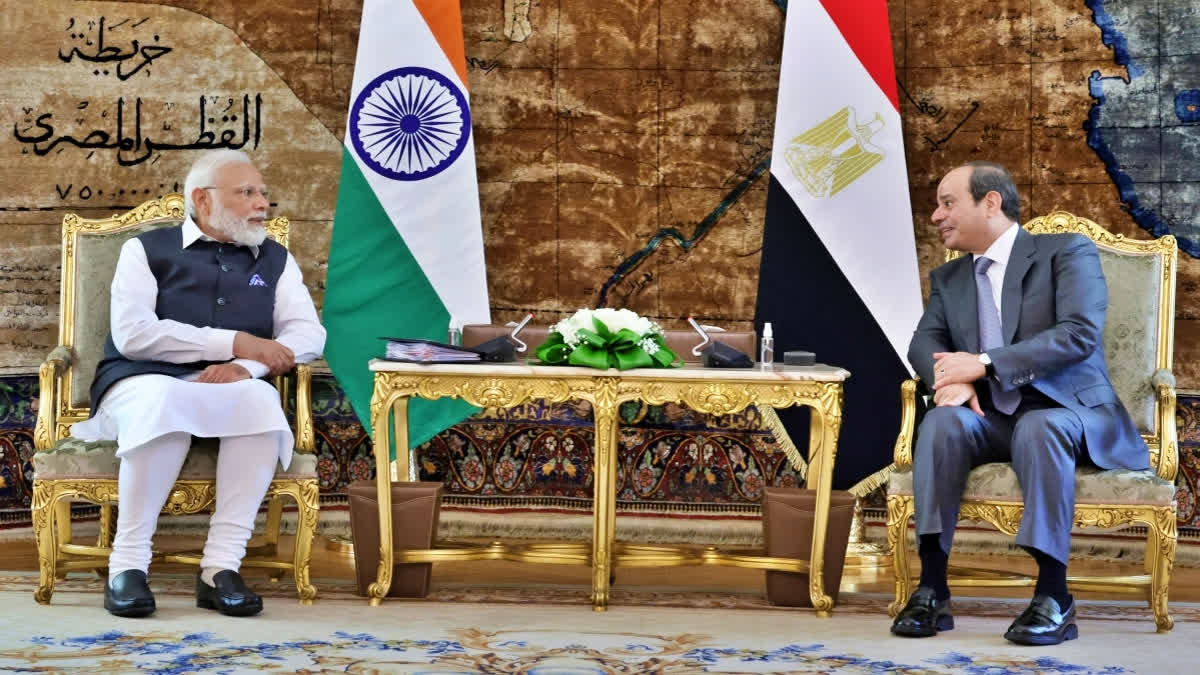New Delhi:As a part of his diplomatic outreach to West Asia, Prime Minister Narendra Modi completed his two-day official visit to Egypt on Sunday. He has given his personal touch to the country’s diplomatic policies since he took office nine years ago in May 2014 and has followed multi-pronged strategies such as Neighbourhood First Policy which was aimed at improving ties with the countries in India's immediate neighbourhood such as Bangladesh, Nepal, Bhutan and Sri Lanka.
While Look East Policy was aimed at improving ties with ASEAN countries, and also with Japan, South Korea and Australia, the Prime Minister has been following a carefully crafted strategy to improve ties with West Asia, including Iran, Saudi Arabia, and UAE. Improving strategic relations with ancient civilization Egypt is the latest in the Prime Minister’s Look West Policy.
As a part of its Look West policy, India has been inviting important leaders from the Middle East and North Africa region as Chief Guests to India’s Republic Day celebrations. It’s a rare honour for those leaders to be invited as Special Guest on India’s Republic Day celebrations as not only the country showcases its military might but it also showcases its cultural diversity on the occasion.
For example, after assuming office in May 2014, Prime Minister Narendra Modi invited the Crown Prince of Abu Dhabi, His Highness Sheikh Mohamed bin Zayed Al-Nahyan, as a Chief Guest on Republic Day celebrations in 2017, making him only the second Gulf leader after King of Saudi Arabia who was invited as Chief Guest in 2006 during Prime Minister Dr Manmohan Singh’s tenure.
In a surprise move, Prime Minister Modi invited Egypt’s President Abdel Fattah El-Sisi to be the Chief Guest for this year’s Republic Day celebrations. President Sisi has been in power since 2014 and his personal visit to the country resulted in improved relations between the two countries as soon after returning to his country he established a dedicated India Unit in the Egyptian Government to boost bilateral relations.
Also, this year India signed a strategic partnership agreement with Egypt which became the 30th country who are designated officially as a strategic partner of India in the world. Not only this, the visit of President Sisi to India catalysed further diplomatic engagements between the countries who share civilizational links as Prime Minister Modi is also visiting the country, the first visit by an Indian Prime Minister in over two decades.
Egypt’s geo-strategic importance for India
With a population of over 100 million, Egypt is the 14th largest country in the world. With an area of over 10 lakh square kilometres, it is the 29th largest country in the world with significant clout in West Asia and North Africa.
Egypt also maintains a robust military as it fought wars with Israel in 1973 over Sinai Mountain and later regained control of the region under a peace treaty. With its large economy, geography and population base, Egypt is a heavyweight among MENA region countries and its capital Cairo is home to the Arab League.
